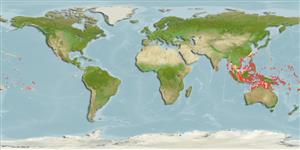Common names from other countries
Environment: milieu / climate zone / depth range / distribution range
Ecologia
marinhas associadas(os) a recifes; intervalo de profundidade 15 - 110 m (Ref. 27115). Tropical; 23°C - 28°C (Ref. 27115); 30°N - 18°S
Pacific Ocean: Indonesia to the Marquesas and Society Islands, north to Ryukyu Islands, south to Scott Reef. Range extends to Easter Island (Ref. 9710). Closely related to Anampses lineatus from the western Indian Ocean.
Tamanho / Peso / Idade
Maturity: Lm ? range ? - ? cm
Max length : 12.0 cm TL macho/indeterminado; (Ref. 9710)
Espinhos dorsais (total): 9; Raios dorsais moles (total): 12; Espinhos anais 3; Raios anais moles: 12. The primary phase of this species closely resembles that of A. meleagrides, but never has a uniformly yellow tail, and the color pattern does not change much with growth or sex (Ref. 1602). Recognized by the yellow bar on the base of the tail (Ref. 48636).
Adults occur in seaward reefs (Ref. 1602). Also in deep coastal to outer reef slopes and drop-offs (Ref. 48636). Solitary or in pairs in the surge zone, rarely to 30 m (Ref. 9710). They swim in small groups, each with several females and a single dominant male (Ref. 48636). Feed on small crustaceans, mollusks and polychaetes. Bury in sand at night (Ref. 9710). Oviparous, distinct pairing during breeding (Ref. 205). Maximum depth reported taken from Ref. 128797.
Life cycle and mating behavior
Maturidade | Reprodução | Desova | Ovos | Fecundidade | Larvas
Oviparous, distinct pairing during breeding (Ref. 205).
Myers, R.F., 1991. Micronesian reef fishes. Second Ed. Coral Graphics, Barrigada, Guam. 298 p. (Ref. 1602)
Categoria na Lista Vermelha da IUCN (Ref. 130435)
CITES (Ref. 128078)
Not Evaluated
Ameaça para o homem
Harmless
Utilização humana
Aquário: Espécies comerciais
Mais informação
ReferênciasAquaculturaPerfil para aquaculturaEstirpesGenéticaElectrophoresesHereditariedadeDoençasProcessamentoMass conversion
Ferramentas
Relatórios especiais
Descarregue XML
Fontes da internet
Estimates based on models
Preferred temperature (Ref.
115969): 25.3 - 29, mean 28 (based on 226 cells).
Phylogenetic diversity index (Ref.
82804): PD
50 = 0.5002 [Uniqueness, from 0.5 = low to 2.0 = high].
Bayesian length-weight: a=0.00977 (0.00470 - 0.02030), b=3.07 (2.89 - 3.25), in cm Total Length, based on LWR estimates for this (Sub)family-body shape (Ref.
93245).
Nível Trófico (Ref.
69278): 3.4 ±0.41 se; based on food items.
Resiliência (Ref.
120179): Elevada, tempo mínimo de duplicação da população menor que 15 meses (Preliminary K or Fecundity.).
Fishing Vulnerability (Ref.
59153): Low vulnerability (10 of 100).
